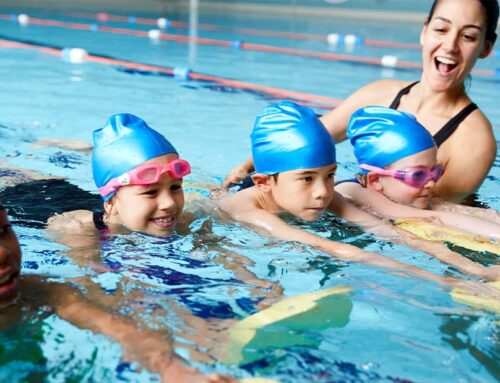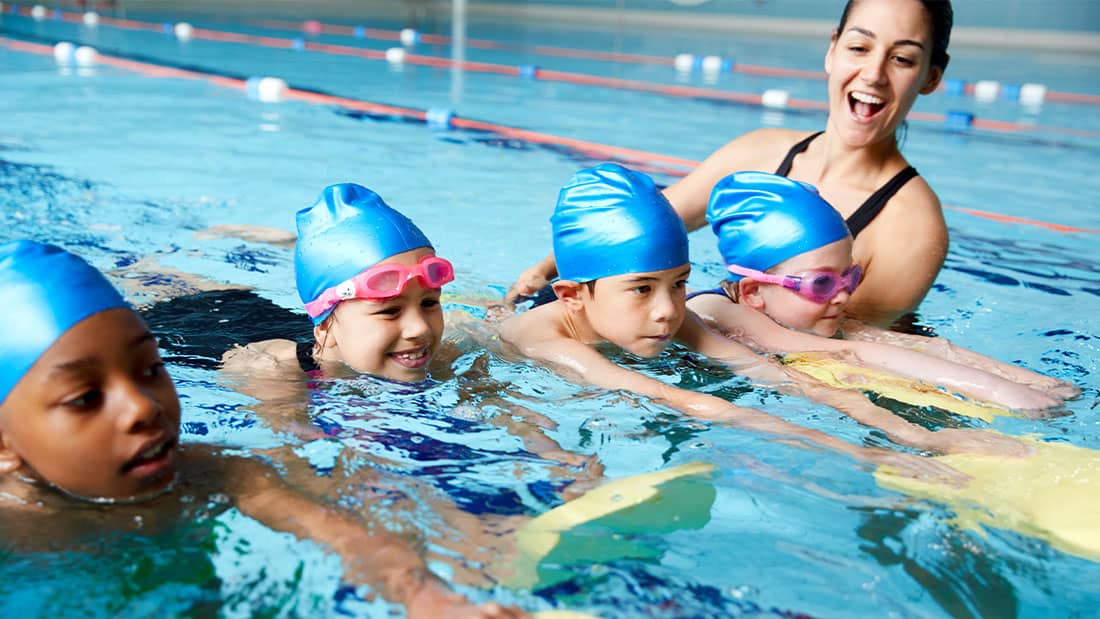5 Science-Backed Training Tips Swimmers Can Use to Dominate the Pool
Swimmers spend a lot of time working on their technique and conditioning in the water.
Around and around the black line they go, throwing up astronomical numbers of meters and yards on their quest to being at their physical peak on race day.
But very few will spend a fraction of that time working on their mental resiliency in the water. Which is odd, as most of the issues that come up for swimmers are because of the way they mentally approach the sport.
For instance, when things don’t go their way in competition, swimmers will say that they choked or froze under pressure. They will complain and short-shrift their effort and focus in training, costing them valuable opportunities to improve. All of these things originate between the ears, and yet, there’s a small appetite to give them any kind of meaningful attention.
Which is too bad—getting a grip on your mindset will help you remove the invisible parking brake that’s keeping you from reaching your peak potential in the water. With that in mind, here are five of my favorite mental tips that can help swimmers level up their mindset in and out of the pool.
1. Get Fired Up With Some Tunes
Music is one of the classic pump-up techniques people in the gym use to feel invigorated and jacked up to work hard. There’s also a ton of research that backs up the effectiveness of music as a training aid. As a result, you’d be hard pressed to find an athlete in the gym not listening to music. When it comes to rocking out in the pool, waterproof electronics were long a barrier. But this is no longer the case.
In one study, researchers had a group of recreational swimmers do some 50m and 800m time trials. Those who strapped a waterproof mp3 player to their head swam faster—with a reduction of 0.32 seconds on the 50s and over 6 seconds on the 800.
Now, there are some limitations to this, obviously. You can’t exactly strap on a waterproof mp3 player when you are getting up on the blocks in competition. But it can certainly help you power through some of those long morning workouts, and that might just be enough to gain an edge.
2. Put Positive Self-Talk on Your Water Bottle
All day and all practice long we are carrying on a conversation with ourselves. Some of it is good and supportive (“You got this!”) and some of it is counter-productive and negative (“You suck at this, might as well give up.”)
Managing your self-talk is one of those skills that can help you power through hard workouts, give you a sense of calm when you feel the butterflies taking over, and help you focus on the things that need focusing when swimming.
How can you improve your self-talk?
By making the self-talk you want to use more visible. When researchers took a group of 41 competitive swimmers they split them into two groups—one performed a 10-week self-talk intervention while the other half trained as normal.
Part of the intervention was having the self-talk the swimmers wanted to use at the end of their lane at practice each day, so that it was front and center and hard to ignore or forget. The self-talk group ended up out-performing the control by almost 1.5% in competition after the ten weeks, showing just how critical this largely unseen mental skill can be.
Write out the self-talk you want to use and make it visible—on your water bottle, kickboard, on your fridge—anywhere where you will see it often. Make it simple, positive and powerful.
3. Visualize Before High-Intensity Reps
Visualization is a tool you are already using, whether you realize it or not. When you lay in bed the night before a super hard practice, thinking about how much it’s going to hurt, you’re visualizing (but not in a very positive way). Visualization is a tool elite swimmers regularly use, as legends like Michael Phelps, Katie Ledecky and Canadian Olympic champion Mark Tewksbury make it a key part of their routine.
Although most athletes will save visualization to prepare themselves for competition, a simple way you can use this mental skill to greater effect is during practice in the moments before a high-intensity effort.
When a group of male track athletes were given a series of psych-up strategies in the moments before a 30-meter sprint, what’s known as “performing imagery” contributed to the biggest boost in performance. Essentially, they pictured themselves running fast or getting a phenomenal start.
Swimmers can use this to their advantage in training by visualizing the body position they want, the feeling of swimming downhill, and the sensation of the water streaming past their face. Spend those precious moments between reps and sets in the water visualizing how you want to swim.
4. Follow a Pre- and Post-Workout Routine
How often have you gone to the pool and allowed your effort to be dictated by how you were feeling? Basing effort on the moment-to-moment whims of our stress levels and mood means you can never really predict how your practice or race is going to go. One day you are going to “feel it,” and the next, well, not so much.
One of the ways to make your performance in the water more consistent is to use a pre-workout and pre-race routine. Successful swimmers don’t just have awesome results on the day of competition. They have excellent routines and systems in training.
This can mean having an identical warm-up routine every day (which maybe includes some of that visualization we just talked about), a commitment to starting the main set (no matter how much you “feel like it”), and a habit of placing performance-enhancing activities around your workouts (nutrient-packed meal for post-workout, proper fuel pre-workout, etc).
When you look at the way you prepare for practice and competition, how much of it consists of things you can control and plan for? If your answer is “not much,” then you’re leaving much of your performance on race day up to chance.
5. Get More Sleep
The life of a competitive swimmer is no joke—there is an endless season, long practices in the water, and two-a-days that leave your finger-tips perpetually wrinkled and smelling of chlorine. Combine that with school and/or work and the first thing to suffer is usually your sleep. This doesn’t just leave you feeling more cranky, but also less mentally tough.
Being mentally tougher isn’t always about gritting your teeth and pushing through the pain. it’s about putting yourself in the circumstances where you can better withstand stress. And guess what happens when you are sleep-deprived?
Rate of perceived exertion goes up. Your ability to focus decreases. According to one study, students who were considered mentally tougher slept more, slept better and woke up less compared to their less mentally tough peers.
Make sleep and rest a priority. Not only will you recover faster, better positioning you to crush it in the pool tomorrow, but your mindset will benefit, as well.
READ MORE:
RECOMMENDED FOR YOU
MOST POPULAR
5 Science-Backed Training Tips Swimmers Can Use to Dominate the Pool
Swimmers spend a lot of time working on their technique and conditioning in the water.
Around and around the black line they go, throwing up astronomical numbers of meters and yards on their quest to being at their physical peak on race day.
But very few will spend a fraction of that time working on their mental resiliency in the water. Which is odd, as most of the issues that come up for swimmers are because of the way they mentally approach the sport.
For instance, when things don’t go their way in competition, swimmers will say that they choked or froze under pressure. They will complain and short-shrift their effort and focus in training, costing them valuable opportunities to improve. All of these things originate between the ears, and yet, there’s a small appetite to give them any kind of meaningful attention.
Which is too bad—getting a grip on your mindset will help you remove the invisible parking brake that’s keeping you from reaching your peak potential in the water. With that in mind, here are five of my favorite mental tips that can help swimmers level up their mindset in and out of the pool.
1. Get Fired Up With Some Tunes
Music is one of the classic pump-up techniques people in the gym use to feel invigorated and jacked up to work hard. There’s also a ton of research that backs up the effectiveness of music as a training aid. As a result, you’d be hard pressed to find an athlete in the gym not listening to music. When it comes to rocking out in the pool, waterproof electronics were long a barrier. But this is no longer the case.
In one study, researchers had a group of recreational swimmers do some 50m and 800m time trials. Those who strapped a waterproof mp3 player to their head swam faster—with a reduction of 0.32 seconds on the 50s and over 6 seconds on the 800.
Now, there are some limitations to this, obviously. You can’t exactly strap on a waterproof mp3 player when you are getting up on the blocks in competition. But it can certainly help you power through some of those long morning workouts, and that might just be enough to gain an edge.
2. Put Positive Self-Talk on Your Water Bottle
All day and all practice long we are carrying on a conversation with ourselves. Some of it is good and supportive (“You got this!”) and some of it is counter-productive and negative (“You suck at this, might as well give up.”)
Managing your self-talk is one of those skills that can help you power through hard workouts, give you a sense of calm when you feel the butterflies taking over, and help you focus on the things that need focusing when swimming.
How can you improve your self-talk?
By making the self-talk you want to use more visible. When researchers took a group of 41 competitive swimmers they split them into two groups—one performed a 10-week self-talk intervention while the other half trained as normal.
Part of the intervention was having the self-talk the swimmers wanted to use at the end of their lane at practice each day, so that it was front and center and hard to ignore or forget. The self-talk group ended up out-performing the control by almost 1.5% in competition after the ten weeks, showing just how critical this largely unseen mental skill can be.
Write out the self-talk you want to use and make it visible—on your water bottle, kickboard, on your fridge—anywhere where you will see it often. Make it simple, positive and powerful.
3. Visualize Before High-Intensity Reps
Visualization is a tool you are already using, whether you realize it or not. When you lay in bed the night before a super hard practice, thinking about how much it’s going to hurt, you’re visualizing (but not in a very positive way). Visualization is a tool elite swimmers regularly use, as legends like Michael Phelps, Katie Ledecky and Canadian Olympic champion Mark Tewksbury make it a key part of their routine.
Although most athletes will save visualization to prepare themselves for competition, a simple way you can use this mental skill to greater effect is during practice in the moments before a high-intensity effort.
When a group of male track athletes were given a series of psych-up strategies in the moments before a 30-meter sprint, what’s known as “performing imagery” contributed to the biggest boost in performance. Essentially, they pictured themselves running fast or getting a phenomenal start.
Swimmers can use this to their advantage in training by visualizing the body position they want, the feeling of swimming downhill, and the sensation of the water streaming past their face. Spend those precious moments between reps and sets in the water visualizing how you want to swim.
4. Follow a Pre- and Post-Workout Routine
How often have you gone to the pool and allowed your effort to be dictated by how you were feeling? Basing effort on the moment-to-moment whims of our stress levels and mood means you can never really predict how your practice or race is going to go. One day you are going to “feel it,” and the next, well, not so much.
One of the ways to make your performance in the water more consistent is to use a pre-workout and pre-race routine. Successful swimmers don’t just have awesome results on the day of competition. They have excellent routines and systems in training.
This can mean having an identical warm-up routine every day (which maybe includes some of that visualization we just talked about), a commitment to starting the main set (no matter how much you “feel like it”), and a habit of placing performance-enhancing activities around your workouts (nutrient-packed meal for post-workout, proper fuel pre-workout, etc).
When you look at the way you prepare for practice and competition, how much of it consists of things you can control and plan for? If your answer is “not much,” then you’re leaving much of your performance on race day up to chance.
5. Get More Sleep
The life of a competitive swimmer is no joke—there is an endless season, long practices in the water, and two-a-days that leave your finger-tips perpetually wrinkled and smelling of chlorine. Combine that with school and/or work and the first thing to suffer is usually your sleep. This doesn’t just leave you feeling more cranky, but also less mentally tough.
Being mentally tougher isn’t always about gritting your teeth and pushing through the pain. it’s about putting yourself in the circumstances where you can better withstand stress. And guess what happens when you are sleep-deprived?
Rate of perceived exertion goes up. Your ability to focus decreases. According to one study, students who were considered mentally tougher slept more, slept better and woke up less compared to their less mentally tough peers.
Make sleep and rest a priority. Not only will you recover faster, better positioning you to crush it in the pool tomorrow, but your mindset will benefit, as well.
READ MORE:












